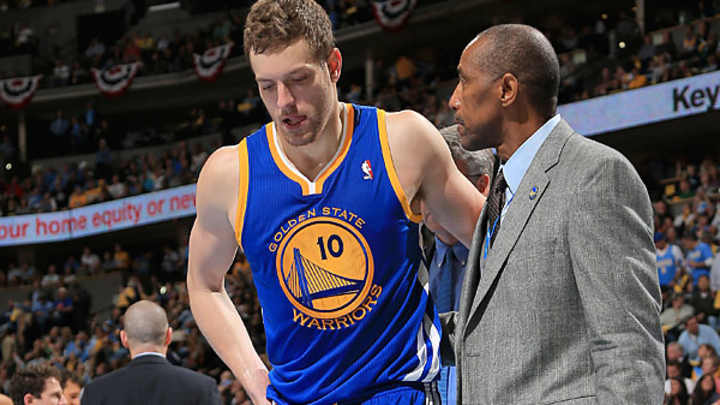Warriors forced to cope after losing David Lee in first career playoff game

David Lee is done for the season with a hip injury. (Doug Pensinger/Getty Images)

Warriors forward David Lee has been lost for the remainder of the playoffs with a torn right hip flexor, and the immediate, consensus reaction has been empathy, and rightfully so.
Twists of fate don't get much crueler. The injury amounts to the NBA All-Star's version of standing in line all week for a new iPhone on release day, only to have the product sell out just as you reach the front. Or, a child's birthday party at the ballpark wiped out by a freak thunderstorm moments after the conclusion of the national anthem. Lee made it just 29 minutes into the first playoff game of his eight-year career, suffering a fluky injury on an awkward landing before he got the chance to make a mark in the postseason, something he had spoken openly about since training camp.
“It’s been a long time to wait,” Lee said this week, according to the Associated Press. “I’m having to do more to calm myself down than to get hyped to be ready for it.”
The bummer stakes for Lee are clear; the deflating impact of his departure on the Warriors, now down 1-0 to the Nuggets, should be equally obvious. Lee played more than 2,900 minutes this season: while that ranked only third on the Warriors, behind Stephen Curry and Klay Thompson, that's a massive load, ranking him No. 12 league-wide. A dependable, efficient offensive threat, Lee was Golden State's No. 2 scorer, behind Curry, and No. 1 rebounder by a mile. His 11.2 rebounds per game nearly doubled Carl Landry's six-per-game average, the next highest figure among Warriors who played at least 40 games this season.
Golden State's offense ranked No. 10 league-wide in large part because Lee functions well in pick-and-rolls and on the offensive glass, and because he's a versatile, multi-talented option. The Warriors' offensive rating dipped from 106.2 to 98.7 when he left the court this season, a mammoth drop, and Lee was a member of Golden State's top-nine most-used lineups, having missed just three games all season.
Warriors coach Mark Jackson has an able fill-in for Lee in Landry, who averaged 10.8 points and shot 54 percent this season. Landry was already averaging 23.2 minutes per game, though, and the rest of Lee's minutes will need to be divided up between the likes of rookies Draymond Green and Festus Ezeli, who both barely played in Game 1. The first decision for Jackson will be whether to move Landry into the starting lineup or to keep him in the second unit for continuity's sake while spot-starting one of the rookies. Green, unlike both Lee and Landry, improves Golden State's defensive rating when he's on the court. He's the most likely candidate to see his minutes spike, although Jackson could also entertain longer stretches of small ball.
Subtracting Lee from Golden State's pool of available players is a blow in and of itself, but it comes with more bad news for the Warriors, as the Nuggets are expected to get hyper-athletic, hyper-active forward Kenneth Faried back from an ankle injury for Game 2. Without Faried, their leading rebounder, Denver went mostly to smaller lineups, playing essentially an eight-man rotation that included just two bigs, Kosta Koufos and JaVale McGee, with Anthony Randolph getting just six minutes of action on the outskirts. Consequently, Golden State enjoyed a +10 rebounding margin, thanks to 14 rebounds each from Lee and center Andrew Bogut. Denver, the league's No. 4 team in rebound rate, won't likely see that double-digit deficit repeat as the series unfolds with Faried and without Lee.
